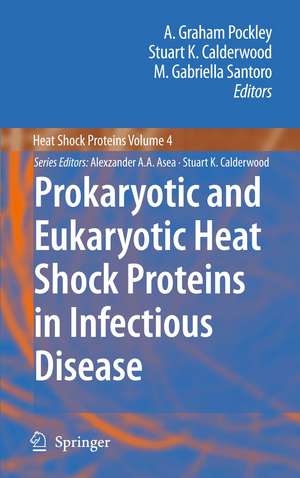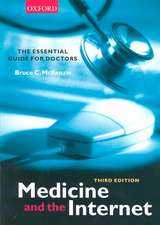Prokaryotic and Eukaryotic Heat Shock Proteins in Infectious Disease: Heat Shock Proteins, cartea 4
Editat de A. Graham Pockley, Stuart K. Calderwood, M. Gabriella Santoroen Limba Engleză Paperback – 14 mar 2012
| Toate formatele și edițiile | Preț | Express |
|---|---|---|
| Paperback (1) | 1411.17 lei 6-8 săpt. | |
| SPRINGER NETHERLANDS – 14 mar 2012 | 1411.17 lei 6-8 săpt. | |
| Hardback (1) | 1416.66 lei 6-8 săpt. | |
| SPRINGER NETHERLANDS – 27 noi 2009 | 1416.66 lei 6-8 săpt. |
Din seria Heat Shock Proteins
- 15%
 Preț: 659.02 lei
Preț: 659.02 lei - 5%
 Preț: 732.92 lei
Preț: 732.92 lei - 15%
 Preț: 649.87 lei
Preț: 649.87 lei - 15%
 Preț: 649.87 lei
Preț: 649.87 lei - 15%
 Preț: 659.70 lei
Preț: 659.70 lei - 5%
 Preț: 728.69 lei
Preț: 728.69 lei - 18%
 Preț: 953.35 lei
Preț: 953.35 lei - 20%
 Preț: 558.40 lei
Preț: 558.40 lei - 18%
 Preț: 956.03 lei
Preț: 956.03 lei - 24%
 Preț: 790.27 lei
Preț: 790.27 lei - 24%
 Preț: 809.89 lei
Preț: 809.89 lei - 5%
 Preț: 1426.16 lei
Preț: 1426.16 lei - 20%
 Preț: 561.86 lei
Preț: 561.86 lei - 5%
 Preț: 1094.97 lei
Preț: 1094.97 lei - 18%
 Preț: 1119.24 lei
Preț: 1119.24 lei - 5%
 Preț: 1424.68 lei
Preț: 1424.68 lei - 5%
 Preț: 1417.91 lei
Preț: 1417.91 lei - 5%
 Preț: 1095.16 lei
Preț: 1095.16 lei - 5%
 Preț: 1116.21 lei
Preț: 1116.21 lei - 5%
 Preț: 1434.75 lei
Preț: 1434.75 lei - 5%
 Preț: 1107.21 lei
Preț: 1107.21 lei
Preț: 1411.17 lei
Preț vechi: 1485.45 lei
-5% Nou
Puncte Express: 2117
Preț estimativ în valută:
270.06€ • 280.91$ • 222.95£
270.06€ • 280.91$ • 222.95£
Carte tipărită la comandă
Livrare economică 14-28 aprilie
Preluare comenzi: 021 569.72.76
Specificații
ISBN-13: 9789400730878
ISBN-10: 940073087X
Pagini: 324
Ilustrații: XII, 312 p.
Dimensiuni: 155 x 235 x 17 mm
Greutate: 0.45 kg
Ediția:2010
Editura: SPRINGER NETHERLANDS
Colecția Springer
Seria Heat Shock Proteins
Locul publicării:Dordrecht, Netherlands
ISBN-10: 940073087X
Pagini: 324
Ilustrații: XII, 312 p.
Dimensiuni: 155 x 235 x 17 mm
Greutate: 0.45 kg
Ediția:2010
Editura: SPRINGER NETHERLANDS
Colecția Springer
Seria Heat Shock Proteins
Locul publicării:Dordrecht, Netherlands
Public țintă
ResearchCuprins
Role of HSF1 in Infectious Disease.- Propagating Prions: An Essential Role for Molecular Chaperones.- Role of Heat Shock Proteins in Viral Infection.- Chaperones in the Morphogenesis of Viruses.- Role of Host Molecular Chaperones in Responses to Bacterial Infection and Endotoxin Exposure.- Mycobacterial Heat Shock Protein 60s in the Induction and Regulation of Infectious Disease.- Heat Shock Proteins in Protozoan Parasites – Leishmania spp..- Toll-Like Receptors and Infectious Diseases: Role of Heat Shock Proteins.- Lipid Rafts, Lipopolysaccharide and Stress Proteins in Infectious Diseases.- Heat Shock Proteins Are Mediators of Bacterial-Host Interactions.- Membrane-Expressed and Extracellular Stress Proteins in Infectious Disease.- Circulating Stress Proteins in Infectious Disease.- Heat Shock Proteins, Genital Tract Infections and Reproductive Outcome.- Heat Shock Proteins and Oral Diseases: Special Focus on Periodontitis.- Temperature Matters: Cellular Targets of Hyperthermia in Cancer Biology and Immunology.








